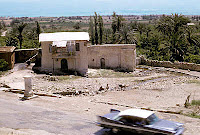Near the ancient ruins of Old Jericho, a spring burbles out of the ground, just as it did long before the famous city walls came tumblin down. It’s called Ain-es Sultan or Elisha’s Fountain. The story associated with this spring is told in 2 Kings 2.
The men of Jericho said to Elisha, "Look, our lord, this town is well situated, as you can see, but the water is bad and the land is unproductive." "Bring me a new bowl," he said, "and put salt in it." So they brought it to him. Then he went out to the spring and threw the salt into it, saying, "This is what the LORD says: 'I have healed this water. Never again will it cause death or make the land unproductive.'" And the water has remained wholesome to this day, according to the word Elisha had spoken 2 Kings 2:19-22.
People everywhere depend on good sanitation and a consistent supply of clean water, but the citizens of Jericho had recently noticed their water becoming bad – really bad. Perhaps it just tasted bad, or perhaps people were getting sick. The fields had become less and less productive. All indicators pointed to the water, so they asked Elisha for help. Elisha poured a bowl of salt into the spring and announced that Yahweh had personally healed the waters. The proof was in the pudding – and wholesome water has flowed there ever since.
Interesting that Elisha used salt as an agent, but credits God with the miracle. We use salt in our water softener to replace the hard-water calcium with sodium to made our water more palatable, but the problem in this town was not hard water. This water was contaminated.
As my wife and her hydrogeology colleagues tell me, it takes a lot more than a bowl of salt to remediate a contaminated well or aquifer. In fact, salt would be considered a contaminant, and there’s a lot more chemistry and technical know-how required to get the job done right. But when they do get it right, remediation efforts are more than worthwhile. The outcome is transformative for the community.
A prophet may use miraculous signs as the Chronicler tells us Elisha did, and a modern day hydrogeologist will use more technical methods, but both are doing the work of God in the world. People who attend to a community’s water supply and who work to resolve its problems and deficiencies and who safeguard this supply are working as stewards of the earth and co-creators with God for the good of people. Their interventions make clean water flow and healthy communities and productivity possible. They belong to a noble profession with a good lineage!
And that may help explain Elisha’s use of salt, even if it doesn’t explain all the chemistry. Salt was commonly used as a preservative or disinfectant and was regarded as having spiritual significance. Perhaps Elisha used salt to signal the townspeople that God was present among them. In similar fashion Jesus tells his followers that they are salt agents in the world. “You’re here to be salt-seasoning that brings out the God-flavors of this earth. If you lose your saltiness, how will people taste godliness?” Matthew 5:13 The Message
As in Elisha’s day, there’s lots that needs healing in our culture and our world; we have a role to play as God’s agents. Perhaps some opportunity to bring the compassion and power of God to bear on a situation of human or environmental need is right under your nose.
Don't you wonder how God might want to use you today as an influence for good?
Image Sources:
Ain-es-Sultan - Life in the Holy Land
Jericho - Nooks n Corners
Salt - Epsom Salts




No comments:
Post a Comment